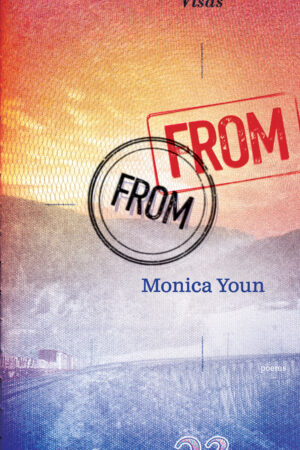From From
by Monica Youn
reviewed by Margaret Schnabel
“Where are you from? No—where are you from from?”
To mention the Asianness of the figures is also to mention, by implication, the Asianness of the poet.
Revealing a racial marker in a poem is like revealing a gun in a story or like revealing a nipple in a dance.
Youn’s unsettlingly patient tone acts as the ultimate condemnation: she exposes the delusions of racist reasoning simply by laying them bare.
Despite the gravity of the topics Youn tackles—from the murder of Latasha Harlins to Greek mythology, Korean royal history, and the 2021 Atlanta shootings—her structural and stylistic choices bear more than a passing resemblance to stand-up comedy. Like a comic, Youn has a knack for excavating personal experiences for their most revealing moments, affording herself little sympathy in the process. In “Deracinations: Eight Sonograms (8. Canon),” she writes:
Orientalist
cliché, she snorted in disdain
(she had recently read Said …or at least the introduction).
This sharp gaze is equally funny when turned on creative writing instructors: “Write what / you know, said her workshop instructor. / Here’s some Seamus Heaney.”
Youn’s rhythm allows her to craft micro-jokes out of the syntax and pacing of speech, as in “Study of Two Figures (Agave/Pentheus)”:
Her son drank from the sweetness she named him Sorrow.
Um … why? people asked.
She said she was first going to name him Sparrow eater of seeds but then she realized her
seeds were poison.People kept asking questions.
She said it was an Asian thing and then they stopped asking.
Here, Youn envisions the “gun” of race deployed tactically—for its ability to end a conversation. The joke marks both a defeat and triumph for Agave, who speaks to an audience only satisfied with a racialized explanation but wields that knowledge to her advantage.
The glory of From From lies in its inexhaustibility. Where conversations get shut down, Youn’s poems do not—they simply shift focus. The resulting poems are disorienting; grotesque and outraged in one moment, witty and collected in the next. Despite Youn’s matter-of-fact tone, readers can never be certain exactly where her sympathies lie or what level of irony or earnestness is being conveyed.
In the collection’s final poem, “Detail of the Rice Chest,” Youn highlights a moment of personal disorientation:
There is something almost comic about such an excess of rope to bind a single imprisoned and dying man, the way there is something almost comic about a circle of guns pointed at a single unarmed man. I say almost comic rather than actually comic because, although these images provoke the same pent-up tension as suppressed laughter, I do not know who would find either of these images funny.
What we find funny, Youn suggests, has a lot to do with what audience we are a part of. Identity informs reading dynamics: power relations are everywhere, even though readers may assume themselves to be passive recipients guided by a narrator’s whims.
Later, Youn takes as her subject the triple-entendre “chink”: an opening that light passes through; a break in armor; a slur against Asians and particularly Chinese-Americans. As the poem—and the collection—draws to a close, Youn depicts herself as an opening.
There is a “you” in this poem.
You are a member of the English-speaking audience.
I let you see into the box, into what is private, into what is foreign, into what is
inscrutable, into what has been buried.I am the chink in the box.
The “chink in the box” simultaneously obscures and reveals—which is what language can only ever do, too. From From turns our attention to serious matters using the tools of the comic. In an increasingly absurd world, perhaps sitting in and reflecting on the “almost comic” gets us closest to the truth.
Published on September 8, 2023

